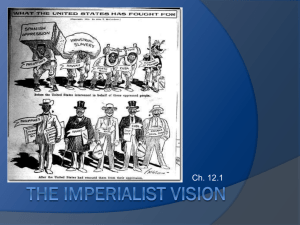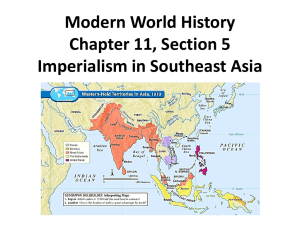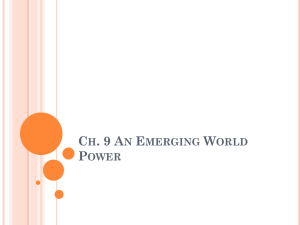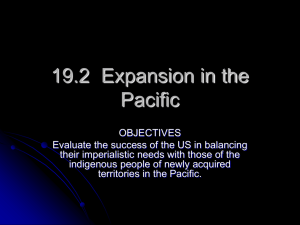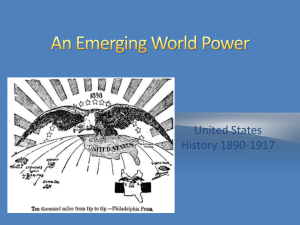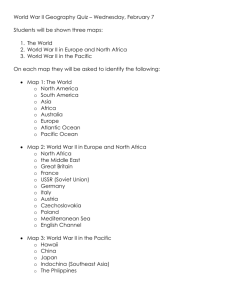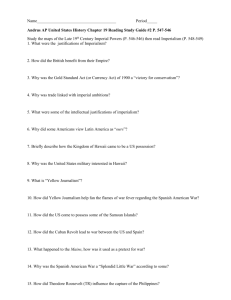extra credit HW- political cartoons
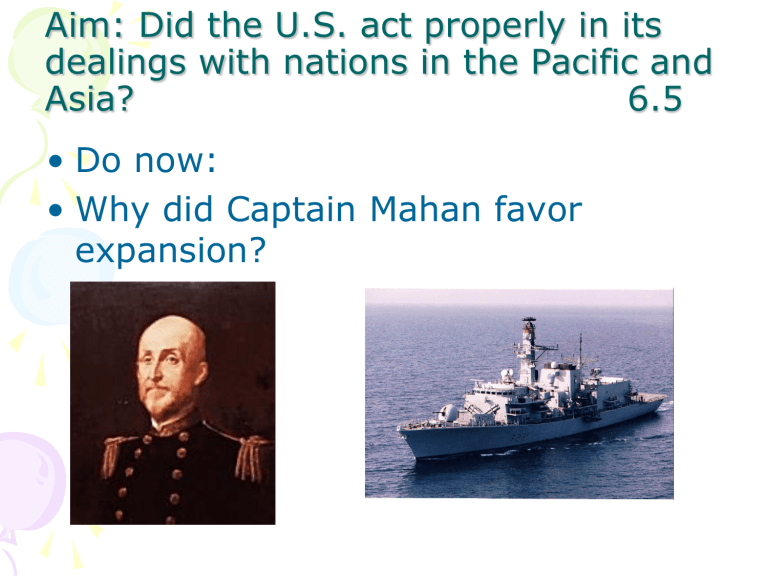
Aim: Did the U.S. act properly in its dealings with nations in the Pacific and
Asia? 6.5
• Do now:
• Why did Captain Mahan favor expansion?
Answer to do now
• Our growth as a nation depends upon expansion
• We must expand to control the seas/ more military bases
reminder
You have hw tonight (review sheet)
Next slide shows option for extra credit. It will be on the website later today.
Multiple choice test is still scheduled for Thursday 2/11. Essay will be after
Winter Break.
Extra credit option (it will be on the website later today)
View any 2 political cartoons in this link
• A. Write the caption so I can identify which cartoon you are writing about.
• B. Explain the cartoonists point of view in 2-3 sentences (What statement is he making?)
• C. Explain whether you agree or disagree with his point of view.
• http://ocw.mit.edu/ans7870/21f/21f.027/civilizati on_and_barbarism/cb_essay03.html
Terms for today
• Imperialism t he policy of extending the rule or authority of an empire or nation over foreign countries, or of acquiring and holding colonies and dependencies.
• Annexation -to add to your nation; incorporate land into a larger territory.
• Hawaii was annexed by the United
States.
Terms for today
• Sphere of influence – an area, often near seaport, where a nation has special trading privileges and controlled economic development.
• European nations had a sphere of influence in China
• Expansionism the doctrine or practice of expanding the economy or territory of a country
More terms for today
• Open Door Policy, John Hay, William
Seward, Queen Liliuokalani, archipelago
Context – setting the stage
• By 1899, the United States was a major power in Asia. The U.S. was very interested in developing trade within the continent. By 1900,
American exports to China had quadrupled.
Why was the United States interested in territories in Asia and the Pacific?
• View slides to help you answer this question
1. Why was the United States interested in territories in Asia and the
Pacific?
• Desire for naval bases
• Desire to control Pacific trade routes
• Desire to become a world power
• Desire to “civilize” or Christianize parts of the world
• Desire to compete with Europe
http://www.youtube.com/watch?v=XpsmUCtsd2o http://www.youtube.com/watch?v=XpsmUCtsd2o
10 minutes video clip.
How do you think the native
Hawaiians felt about being ruled by the USA?
http://www.eastconn.org/tah/1112LD1_AnnexationHawaiiL esson.pdf
lesson plan
2. Why did the U.S. want to annex Hawaii?
• Rich soil, warm climate, rainfall
• Missionaries converted them to
Christianity
• Sugar planters did not want interference from
Queen
• Queen Liliuokalani was forced to resign after U.S. marines landed in
Hawaii.
• Was annexed, then territory, then state (1959)
3. Why did the U.S. want a sphere of influence in China?
• Vast markets and resources
• Competition with
Europeans and
Japan
(prestige/power)
• China was unable to resist the power of other nations to set up spheres of influence.
• Open Door Policy established so U.S. would have equal trading rights.
• Negotiated by US
Secy of State, John
Hay
Review political cartoon on China (dragon)
4. Why was the U.S. also involved in other nations in the Pacific region?
• A. Expansion of trade in Japan
– Commodore Perry (1852) sent warships as a show of force to negotiate a treaty to open up Japanese ports to U.S. trade
B.
Annexation of the Philippines
– As part of the Treaty of Paris 1898, the U.S. gained possession of Philippines (from Spain).
– Caused much debate in U.S.
– Filipino Revolt – 3 year battle resulting in thousands of deaths (20,00 Filipinos died and
4000 Americans died).
– U.S. continued to control this archipelago until
1946 when we granted them independence
.
– Was it worth it???
– Why did we want the Philippines?
Summary: Did the U.S. deal with these nations properly?
• List the positive and negative views regarding U.S. imperialism in the early
20 th century. Include at least three points supporting and three points disagreeing with this foreign policy.
• THEN explain which side you agree with most.
pro
imperialism
con
Conclusion of imperialism part of unit
• Question to consider
• How has our foreign policy changed in the early 20 th century?
• Pros and cons
The United States issued the Open Door policy (1899–1900) primarily to
(1) bring democratic government to the
Chinese people
(2) secure equal trade opportunities in
China
(3) force China to change its immigration policies
(4) use China as a stepping stone to trade with Japan
